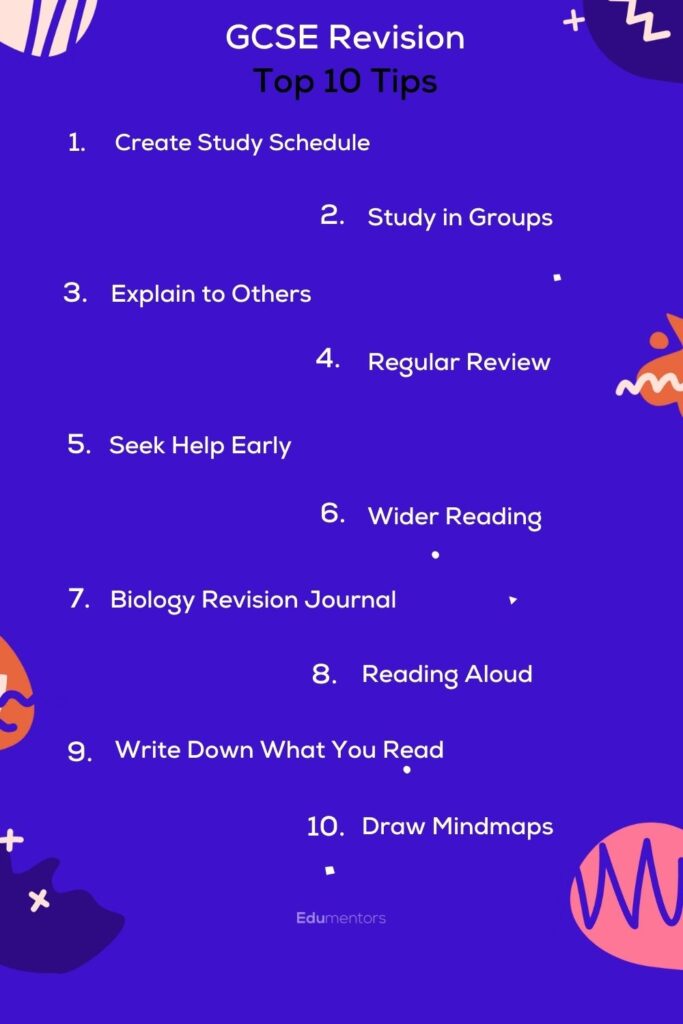How to Revise Biology? – Here is Top 10 Tips

Need to know how to revise biology for exams? We’ve got you. We created blog which includes best tips about revise biology in A-levels and GCSE.
After research we found that lots of students want to find most enjoyable and easy ways to prepare to get high rate which is A*. Therefor we find most unique technics to do so.
Mastering Biology Revision: Your Guide for GCSE and A-Level Success
Introduction
Struggling to memorise all those biology concepts? Don’t worry, we’ve got you covered! Revising for Biology, whether it’s for GCSE Biology or A Level Biology, can seem daunting with the sheer amount of content, but with the right approach and strategies, you can achieve top grades without sacrificing your well-being.
This guide introduces some unique and uncommon tips to make your revision sessions more effective and enjoyable, tailored for both GCSE and A-Level students. If you’re specifically working toward A Level success, you might also want to check out our detailed guide on how to pass A Level Biology with practical strategies and expert advice.
Effective Revision Strategies
- Create Study Schedule
- Study in Groups
- Explain to Others
- Regular Review
- Seek Help Early
- Write Down What you Read
- Biology Revision Journal
- Reading Aloud
- Wider Reading
- Draw Mindmaps
Top 10 Tips for Biology Revision

1. Create Study Schedule
First of all, you need to create a study schedule to know what you are doing and where you are going. Additionally, by writing down a clear schedule, you can perform your tasks more effectively and efficiently. Additionally, writing it down correctly will give you enough space for study, rest, hanging out with friends, and everything else that’s on your mind.
2. Study in Groups
Study in groups will help you and your friends make learning procces more fun and quality. Make sure to get some quiz games, whatch blogs about biology together and then competi with eachother. Also you and your friends can get some prize for winners to spyce things up. This way you can develop very useful features for extrem situacions and your learning procces will be much more funny and interesting.
3. Explain to Others
Get your self in the role of teacher and explain to others what you have already learn. This helps you memorise better. Since biology has very hard termins it would be very helpfull to repeat them often outloud and one of the best ways to do this is explaining it.
4. Regular Review
Here is little biology lesson! When human are memorising something process which brain goes through called synaptic plasticity Synapsis between brainc cells can become stornger if it would be activated more often which means you will memoryse better and stronger.
Depending on that biological explanation, one of the best ways to strengthen your memory is through the regular review of everything you’ve learned. To manage this effectively, you can conduct one or two reviews a day of each part of your study programme. Consequently, this consistent practice helps reinforce your understanding and retention of the material.
5. Seek Help Early
If you find something hard to understand, ask for help right away. For instance, talk to your teacher, tutor, or friends as soon as you have questions. Consequently, getting help early stops small problems from becoming big ones. This way, you can learn better and stay on track with your studies. Lastly, remember that asking for help shows you are committed to doing well.
6. Write Down What You Read
One of the best ways to memorise difficult biological terms is to write them down with explanations. For example, terms like glucagon, mitosis, meiosis, and amylase are hard and require more effort to learn. Therefore, writing them down with their explanations helps reinforce your understanding and retention.
Additionally, this method ensures you have a clear grasp of each term and its significance. For example take paper and write words which you find hard then put it in front of your desk and read it couple times while you are studing. This way you will learn it quicker.
7. Biology Revision Journal
Maintain a dedicated journal where you summarise each study session, jot down questions, and reflect on your progress. This helps consolidate learning and track improvements. Regularly reviewing your journal entries can highlight areas where you need more practice and help you adjust your study plan accordingly.
8. Reading Aloud
Reading aloud enhances memory retention and comprehension by engaging multiple senses. Moreover, this technique helps you process information deeply and catch misunderstandings. Therefore, integrate reading aloud into your study sessions to reinforce key biology concepts effectively.
9. Wider Reading
Expand your horizon by reading more materials, such as newspapers and journal articles. Listening to Biology-related podcasts also keeps you updated on the real-world application of Biology. Giving you a fresh appreciation for the topics you’re studying.
10. Draw Mindmaps
Mindmaps help you see the whole picture and how different concepts interconnect. Firstly, Start by drawing mindmaps for each of your modules. Then, as you progress through the course, create links among the various mindmaps you already have. This visual representation aids in better retention and understanding.
Top 5 Best Study Techniques to Revise for Biology

Find the technique that works for you.
1. Pomodoro technique – The Pomodoro Technique helps you work better by breaking tasks into small parts. You work for 25 minutes, then take a 5-minute break. After doing this four times, take a longer break of 15-30 minutes. This method helps you stay focused and avoid burnout. Pomodoro your way to an A.
2. Space repetition – Spaced repetition helps you remember things better by reviewing them at increasing intervals. You study something, then review it after a few days, then after a week, and so on. This helps keep the information fresh in your memory.
3. 2347 method – The 2357 method is a specific way to use spaced repetition. You review the material after 2 days, then 3 days, 5 days, and finally 7 days. This structured approach helps you retain information more effectively over time.
4. Flashcards – Flashcards are a simple and effective study tool. Write a question or term on one side and the answer on the other. Test yourself regularly to reinforce your memory. They are especially useful for memorising facts, vocabulary, and key concepts. By using flashcards, you can quickly review and retain important information.
5. Blurting – Blurting is a study technique where you read or listen to information, then immediately write down everything you remember without looking at your notes. This helps reinforce what you’ve learned and identifies areas you need to review. Consequently, by practising blurting, you can improve your recall and understanding of the material.
Mastering the Mark Scheme for A-level
Understanding the exam mark scheme is a crucial strategy for succeeding in A-Level Biology. To begin with, familiarise yourself with the specific terminology and detailed answers that examiners expect. Consequently, this knowledge will help you tailor your responses to meet these criteria, significantly improving your chances of achieving higher marks.Consequently, this knowledge helps you tailor your responses to meet these criteria, thereby improving your chances of scoring higher marks.
Regularly review mark schemes from past papers and integrate the required phrases and keywords into your study notes and flashcards. By mastering the mark scheme, you can ensure that your answers are precise and align with what examiners are looking for, significantly boosting your exam performance.
Keep Your Motivation High

Staying motivated throughout the revision period can be challenging. For example Here are some strategies to help you stay on track.
- Biophilic Design
Surround your study space with plants or images of nature. Consequently, this can reduce stress and improve concentration, making your revision sessions more productive.
- Biology Podcasts
Listen to biology-themed podcasts while commuting or during downtime. Podcasts can offer fresh perspectives and reinforce what you’ve learned in a relaxed setting.
Active Recall and Spaced Repetition for GCSE Biology
Active recall and spaced repetition are powerful techniques for mastering GCSE Biology. To begin with, active recall involves testing yourself on key concepts without looking at your notes, forcing your brain to retrieve information, which strengthens memory.
Furthermore, combine this with spaced repetition, where you revisit topics at regular intervals, to ensure long-term retention of information. This method prevents cramming and helps maintain a steady understanding of the material.
Additionally, use flashcards, practice questions, and self-quizzing tools to implement these techniques effectively. By regularly reviewing and testing yourself on the material, you can enhance your understanding and retention. Consequently, this leads to better performance in your exams.
Answer Writing Prompts
After you’ve actively read through the chapter, the next step is to collect prompts from the textbook. Subsequently, use these prompts to test your understanding by writing down detailed explanations or drawing diagrams from memory. This approach helps you identify which concepts you didn’t remember or comprehend fully.
Conclusion
First, recap the main points covered in the blog. Then, consider the unique tips and strategies provided, as they will help you make the most of your GCSE and A-Level Biology revision sessions. Additionally, motivate readers to start their revision journey and apply the tips provided. Ultimately, with consistent effort and the right approach, you’ll be well on your way to achieving top grades in Biology, which will be particularly beneficial for the students using Edumentors for their tutoring needs.
One of the best ways to learn is to work with a private tutor. For example, with Edumentors, you will find tutors who have recently passed these exams with high marks and possess excellent qualifications. Moreover, these tutors include teachers from top-ranking universities.
This combination of recent experience and high-level expertise ensures you receive quality guidance tailored to your needs. Moreover, if you need help with revising biology, check out the available resources and support offered by Edumentors to enhance your learning experience. biology tutors.








